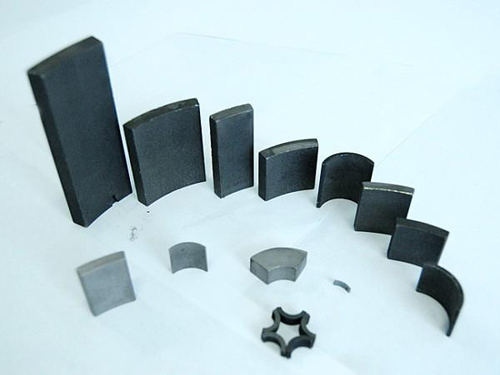
Privacy statement: Your privacy is very important to Us. Our company promises not to disclose your personal information to any external company with out your explicit permission.

Researchers at Temple University and the University of Maryland have discovered a new type of magnet that expands in volume when placed in a magnetic field and wastes as little heat as possible during energy harvesting. This new discovery has enormous potential for application and is expected to not only replace existing technologies but also create new ones. Hashi Dip Chopra, Head of Mechanical Engineering Department, Department of Materials Genomics and Quantum Devices, Temple University, and Manfred Utg, a professor of materials science and engineering at the University of Maryland, published on the 21st Nature published their findings.
Chopra said: "Our findings have fundamentally changed our understanding of a particular type of magnet that we have known since 1841."
In the 1940s, British physicist James Joule discovered that when placed in a magnetic field, iron-based magnetic materials changed their shape, but the volume remained unchanged. This phenomenon is called "joule magnetostriction," and all magnets have demonstrated this feature since the discovery of 175 years.
"We discovered a new class of magnets that we call non-joule magnetostrictive magnets. In the magnetic field, their volume has changed dramatically." Chapula said, "Also, these non-joule magnetostrictive magnets With extraordinary ability to collect or convert energy with minimal heat loss."
Chopra and Utiq heated the specific iron-based alloy in the furnace to approximately 760 degrees Celsius for 30 minutes, after which it was quickly cooled to room temperature, at which time the material exhibited non-joule magnetostrictive behavior.
They found that the heat-treated material contains a tiny honeycomb structure that has never been seen, which is the key to the non-Joule magnetostriction reaction in the magnetic field. Uttig added: "Knowing this unique structure will enable researchers to develop new materials with the same characteristics."
The researchers pointed out that due to Joule magnetostriction, conventional magnets can only be used as actuators that apply force in one direction. Even if it is actuated in only two directions, it requires a lot of bulky magnets, which increases the volume and reduces the efficiency. Non-Joule magnetostrictive magnets can expand in all directions at the same time, so it is easy to make a compact omni-directional actuator.
Because these new magnets also have energy-saving characteristics, they can be used to create a new generation of sensors and actuators with extremely low heat loss for applications in aerospace, automotive, biomedical, defense, space exploration, and robotics.
The researchers also stated that the new magnet does not contain rare earth elements and can therefore replace the existing rare earth-based magnetostrictive materials that are expensive but have low mechanical properties.

Researchers at Temple University and the University of Maryland have discovered a new type of magnet that expands in volume when placed in a magnetic field and wastes as little heat as possible during energy harvesting. This new discovery has enormous potential for application and is expected to not only replace existing technologies but also create new ones. Hashi Dip Chopra, Head of Mechanical Engineering Department, Department of Materials Genomics and Quantum Devices, Temple University, and Manfred Utg, a professor of materials science and engineering at the University of Maryland, published on the 21st Nature published their findings.
Chopra said: "Our findings have fundamentally changed our understanding of a particular type of magnet that we have known since 1841."
In the 1940s, British physicist James Joule discovered that when placed in a magnetic field, iron-based magnetic materials changed their shape, but the volume remained unchanged. This phenomenon is called "joule magnetostriction," and all magnets have demonstrated this feature since the discovery of 175 years.
"We discovered a new class of magnets that we call non-joule magnetostrictive magnets. In the magnetic field, their volume has changed dramatically." Chapula said, "Also, these non-joule magnetostrictive magnets With extraordinary ability to collect or convert energy with minimal heat loss."
Chopra and Utiq heated the specific iron-based alloy in the furnace to approximately 760 degrees Celsius for 30 minutes, after which it was quickly cooled to room temperature, at which time the material exhibited non-joule magnetostrictive behavior.
They found that the heat-treated material contains a tiny honeycomb structure that has never been seen, which is the key to the non-Joule magnetostriction reaction in the magnetic field. Uttig added: "Knowing this unique structure will enable researchers to develop new materials with the same characteristics."
The researchers pointed out that due to Joule magnetostriction, conventional magnets can only be used as actuators that apply force in one direction. Even if it is actuated in only two directions, it requires a lot of bulky magnets, which increases the volume and reduces the efficiency. Non-Joule magnetostrictive magnets can expand in all directions at the same time, so it is easy to make a compact omni-directional actuator.
Because these new magnets also have energy-saving characteristics, they can be used to create a new generation of sensors and actuators with extremely low heat loss for applications in aerospace, automotive, biomedical, defense, space exploration, and robotics.
The researchers also stated that the new magnet does not contain rare earth elements and can therefore replace the existing rare earth-based magnetostrictive materials that are expensive but have low mechanical properties.
November 29, 2024
October 15, 2024
April 20, 2024
この仕入先にメール
November 29, 2024
October 15, 2024
April 20, 2024

Privacy statement: Your privacy is very important to Us. Our company promises not to disclose your personal information to any external company with out your explicit permission.

Fill in more information so that we can get in touch with you faster
Privacy statement: Your privacy is very important to Us. Our company promises not to disclose your personal information to any external company with out your explicit permission.